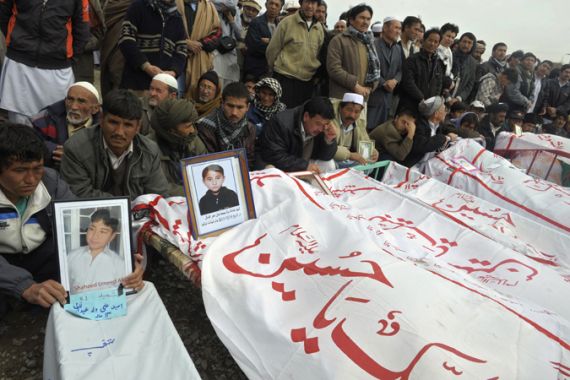Pakistani Shia protest suicide bombing
Armed group Lashkar-e-Jhangvi has claimed responsibility for the attack, the latest to target Pakistan’s Shia community.

Thousands of people have continued to demonstrate across Pakistan following a suicide bombing that killed 24 Shia Muslims, with people refusing to bury victims until the government offers more protection against future attacks.
Members of Quetta’s Hazara ethnic community, which is mostly Shia, began their protest on Wednesday and endured freezing temperatures to spend the night in the open.
“We will not bury our dead bodies until a clear assurance from the government that it will launch a crackdown against terrorists and their sanctuaries,” Abdul Khaliq Hazara, head of the Hazara Democratic Party, told news agency AFP.
A roadside blast on Tuesday hit a bus around 60 kilometres west of Quetta, the capital of southwestern Baluchistan province. It was carrying Shia pilgrims who were returning from Iran.
The Quetta protest attracted about 2,000 people, most of them Shia. Relatives put pictures of the victims with their bodies and sat on the road. There were also demonstrations in Karachi, Lahore, Multan and Rawalpindi, against what protesters called the “genocide” of Pakistani Shias.
The armed group Lashkar-e-Jhangvi (LeJ) claimed responsibility for Tuesday’s attack.
There were similar protests last year after two devastating bomb attacks targeted the Shia Hazara, prompting Islamabad to sack the provincial government.
A Human Rights Watch report this week said LeJ operated “virtual impunity across Pakistan, as law enforcement officials either turn a blind eye or appear helpless to prevent attacks”.
More than 400 Shias were killed in targeted attacks across the country in 2013, the right group said.